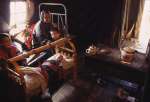- Text size
 |
|  |
|  |
| 
- Français
Chechen refugee finds an outlet for his talent in Georgia's Pankisi Gorge
News Stories, 29 September 2009
TBILISI, Georgia, September 29 (UNHCR) – Anzor has led an often turbulent life, but there has always been one constant – his love of art, especially drawing and woodwork. And it has helped him come to terms with years of exile from his native Chechnya and to build a new life in Georgia's Pankisi Gorge with help from the UN refugee agency.
The 39-year-old was born and grew up in the Chechen capital of Grozny and later became a policeman. His world was turned upside down when the first Chechen War broke out in 1994, forcing Anzor to flee to the forest to escape the conflict. He eked out a precarious living with the help of family and friends.
When a peace treaty granting Chechnya wide autonomy was signed with then Russian President Boris Yeltsin in 1996, Anzor returned home and started a small business. But when war flared up again in 1999, he and his wife, Tsiala, fled across Chechnya's mountainous southern border and sought refuge in the isolated Pankisi Gorge, a broad valley in north-east Georgia.
There are almost 1,000 refugees in the Gorge, including ethnic Chechen and ethnic Kist, a Chechen tribe that settled in Georgia more than 200 years ago. Aside from providing aid and protection, UNHCR funds income generation projects there aimed at bringing benefits to the refugees and the local economy.
Anzor was grateful for the aid provided by UNHCR and others, but he felt uncomfortable being unemployed and reliant on others for all his needs. He decided to fall back on his artistic skills; carving small sculptures from wood had been a hobby ever since his grandfather gave him a small knife as a child.
He realized that his passion could help him become self-sufficient as well as occupy the empty hours, take his mind off Chechnya and restore his pride. He started with a simple job – restoring a wooden wardrobe for the local family that hosted Anzor and his wife.
Soon he was getting orders from others in the valley. When UNHCR and its implementing partner, the Norwegian Refugee Council, launched an income generation project in 2006, Anzor was among the first to apply for a grant; he was given 10,000 Georgian lari (US$6,000) to set up a carpentry workshop.
Anzor was able to make copies of furniture by looking at photos in catalogues and magazines. There were obstacles along the way, but with the money he received from UNHCR, the refugee bought tools and machinery and began to build up a healthy carpentry business.
Anzor now employs six people and his workshop produces a wide range of furniture, including sofas, wardrobes, kitchen fittings, beds, desks and shelves.
The business has done wonders for his bank of balance – and his state of mind. "I became really happy and fulfilled when I was finally able to put my hands back into my own pocket and feel the money I had made – I did not have to ask for help anymore."
What's more, his example inspired his wife, who also approached UNHCR for help in setting up a business. She has established a thriving beauty salon located next to Anzor's workshop. Tsiala's shop, naturally, is equipped with excellent hand-crafted furniture.
By Suzanne Murray-Jones and Anna Chelminska in the Pankisi Gorge, Georgia
































